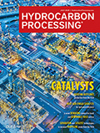Process Optimization
Brazil's Petrobras to invest $4.8 B in integration between Reduc refinery and Boaventura complex
Brazilian state-run oil firm Petrobras will invest 26 billion reais ($4.8 billion) in an integration between the Reduc refinery and the Boaventura energy complex in Rio de Janeiro state.
Digital Feature: The critical interdependency of relief valve analysis and flare system considerations during HAZOP
Hazard and operability (HAZOP) studies are a systematic and structured methodology used to identify potential hazards and operability issues in industrial processes. One of the key safeguards often considered in HAZOP studies is pressure relief valves and flare systems to mitigate overpressure scenarios.
Executive Viewpoint: Heavy industry, light footprint—Helping the HPI run leaner and cleaner with AI
AI has the potential to effect a real change. By harnessing vast amounts of operational data, AI can support process optimization, help to predict equipment failures and better facilitate the integration of renewable energy sources. These capabilities can improve asset performance as well as operational sustainability.
Digital Feature: Flare system design—The importance of periodic evaluation of existing facilities
This article emphasizes the critical importance of routinely revalidating relief and flare system designs, much like the periodic review of process hazard analyses. A detailed case study is reviewed to illustrate the value of such revalidations.
Valmet to deliver Valmet DNA DCS to a bio-based process plant in Portugal
Valmet will deliver a Valmet DNA distributed control system to a bio-based process plant in Portugal. The order was placed by Valmet’s new Value Added Reseller (VAR) partner Tecnilab AV Portugal S.A.
Studi Tecnologie Progetti S.p.A. signs agreement to upgrade Attock refinery in Pakistan for $600 MM
Studi Tecnologie Progetti S.p.A. announced that it has signed a $600-MM contract with Attock Refinery Ltd. for the modernization of the Rawalpindi refinery in Pakistan.
Shell renews contract with Cyberhawk, enabling a global visualization and data integration platform across its portfolio
Cyberhawk™ is pleased to report the renewal of its five-year global agreement with Shell. The comprehensive iHawk™ contract will extend their successful collaboration to projects and assets worldwide and serve a user base that has expanded to more than 6,000.
Partnership for sustainability: Pekutherm and POLYVANTIS launch circular economy initiative
Pekutherm and POLYVANTIS have launched a joint take-back and recycling program for PLEXIGLAS® production waste, aiming to systematically return acrylic to the materials cycle.
Univation Technologies and C3 AI collaborate to deliver enterprise AI solutions for advanced predictive maintenance across the global petrochemical industry
Univation Technologies and C3 AI have entered into a strategic cooperation agreement to commercialize AI-powered predictive maintenance solutions tailored for the petrochemical industry.

- Britain will not bail out bioethanol industry hit by Trump trade deal 8/15
- Russian energy facilities targeted recently in drone attacks 8/15
- Shell: Norco, Louisiana (U.S.) refinery gasoline unit work to start on Friday 8/15
- Sanctions-hit Indian refiner Nayara in talks with govt to sustain operations 8/15
- The API challenges Trump plan to cut biofuel import credits 8/15
- IAG selects record 29 startups for accelerator program 8/15




